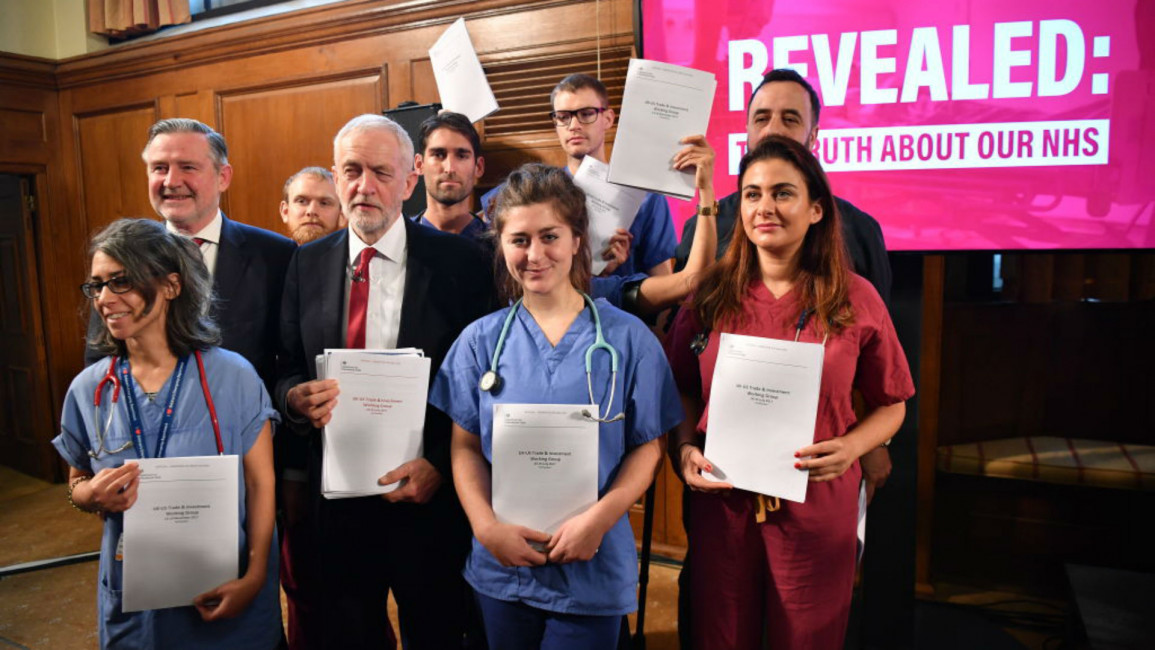
Still think Corbyn's NHS plan was an unrealistic idea? The coronavirus crisis proves otherwise
The very 'radicalism' that earned Corbyn an endless barrage of attacks across mainstream media, parliament, and even his own party (as the recent leaked report on internal sabotage of the 2017 election demonstrates only too vividly) could have delivered greater relief for millions across the UK during the Covid-19 pandemic.
Imagine, for a minute, that we have a leader who puts the interests of a privileged elite class aside, and acts to protect its people over big businesses. Imagine, that the billions in bail-out funds directed towards companies and the stability of billionaires, are redirected to a hugely vulnerable population made up of precarious workers, migrants, and unemployed people already struggling to make ends meet.
Today, one in six UK workers is in insecure and low-paid work and many are having to battle short-term contracts and a lack of stable hours. Our leaders should be taking on the financial burden of securing their wages and protecting them against layoffs, in order to save countless people's lives.
Even the limited crisis pay made available - late in the day, after much popular demand and anger - has raised a whole swathe of issues, not least that workers on hourly or zero hours contracts are unable to access them, and that self-employed workers must be able to demonstrate their "average pay'.
The early announcement by Prime Minister Boris Johnson, that he would provide £350 billion to support businesses, highlights exactly where the government's concerns lie.
Had immediate funds been directed toward some of the hardest hit, then workers, their families and loved ones would not be faced with the prospect of plummeting into severe poverty. It would have also meant limiting the damage caused to the economy through slowing trade and circulation of goods.
 |
Corbyn's mission to nationalise, nationalise, nationalise is not sounding so ludicrous anymore |  |
Such a move would also address the mental health crisis that many are likely to experience as they balance numerous personal, financial and physical pressures with attempting to stay safe throughout this pandemic.
Even the "mortgage holidays" that banks were encouraged to offer after self-isolation was enforced - which for many workers means choosing between not being able to work or risk their health - came with no long-term plan for individuals. If mortgage payments are increased later on to make up for the "holiday" then for some who were already barely making ends meet, it may mean losing their homes entirely.
The government's whole strategy has left all the power in the hands of greedy banks as they decide who even qualifies for financial relief. Many are now likely to be stuck at home, worrying over future mounting payments.
Twitter Post
|
Renters are also in a difficult position due to the financial uncertainty brought on by the pandemic. Payments should be frozen for tenants during this time, and legal protection provided, should landlords attempt to evict them. But instead, from the Tories, we receive nothing but lip-service to real concerns, with little follow through.
The same is true of the half-hearted commitment to shelter all homeless people. Hundreds are still sleeping rough and their lack of access to safe, clean housing makes them increasingly vulnerable.
Read more: UK coronavirus response forces most vulnerable to shoulder the burden
Imagine if ours was a state that temporarily nationalised all empty, private accommodation, providing enough isolation between each individual in need of shelter so that they might be protected. This would further limit the spread of infection in mass shelters, as well as on the streets. It would also help address the severe overcrowding in social housing which would otherwise be a cause of infection.
Corbyn's mission to nationalise, nationalise, nationalise is not sounding so ludicrous anymore. Many white-collar workers and local government employees have been asked to work from home, if only they had access to a nationalised broadband in remote poorly connected areas - a pledge made by Labour in the 2019 general election. The case for access to the internet regarless of income has never been clearer.
More importantly, the wave of nationalisation would help prepare and adequately equip our brave and overworked national health service staff. The immediate response in the UK should have been the temporary takeover of private healthcare providers, especially hospitals and testing labs, given a decade of billion pound cuts has left us gravely ill-prepared for this storm.
A stronger healthcare infrastructure and an increase in resources would also have given the elderly, who are among the most at risk, a fighting chance. Instead, the Tory government has effectively suggested that the elderly be left to die at a time when medical attention, energy and medicine may have to be rationed.
Healthcare workers are expecting to commit to longer hours while they also put themselves in harm's way by serving on the frontlines. At the time of writing, more than 30 have already died.
Imagine instead, a country where unions have won their bid for double pay for all emergency service employees, not just within the NHS but also across food, transport, and delivery companies including postal workers.
 |
Imagine instead, a country where unions have won their bid for double pay for all emergency service employees |  |
These measures would allow the crucial aspects of the economy to continue to function, and make sure that no one is left without medical assistance, necessary supplies, or cut off from the rest of society.
Health workers are not even having their most basic demands for protection met. Abdul Mabud Chowdhury, a doctor at Homerton Hospital in London, died of the coronavirus at the age of 53 after pleading with the government for personal protective equipment (PPE) for NHS staff.
Prior to the pandemic, racism and fascism were on the rise. Since the outbreak, the turn to name Covid-19 the "Chinese virus", as it has already been branded by racists on the streets and in the White House, has led to even more abuse. Corbyn's unwavering commitment to anti-racist struggles and his legacy of supporting grassroots movements is urgently needed.
Where is the government's promise to tackle all forms of hate during this crisis? Instead, they are sending out police officers, with greater repressive powers, to harass people in public spaces, as if they - rather than the criminal lack of infrastructure, is the problem.
 |
All of this could, and should be our reality. It isn't a faraway dream, nor an economic impossibility |  |
All of this could, and should be our reality, during this pandemic. It isn't a faraway dream, nor an economic impossibility. The money is there and in fact, spending it would help reinvigorate the economy.
The state does not have to be used to support and defend the rich alone. Yet the media, the right wing of the Labour Party, and their assorted think thanks have barred that possible future for us all.
It is now up to us - community activists, students, and workers - to force the Johnson government to implement the changes that will see us all through this difficult times.
Malia Bouattia is an activist, a former president of the National Union of Students, and co-founder of the Students not Suspects/Educators not Informants Network.
Follow her on Twitter: @MaliaBouattia
Opinions expressed in this article remain those of the author and do not necessarily represent those of The New Arab, its editorial board or staff.




